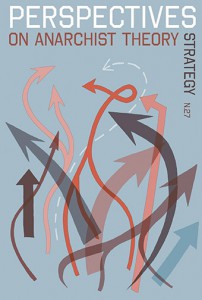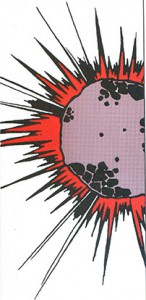Look what’s inside the new issue of Perspectives on Anarchist Theory…
 Did you know that some of the folks involved with the Institute for Anarchist Studies (anarchist grant-givers extraordinaires, and also the co-publishers of our Anarchist Interventions series!) put out a journal, too? Well, now you do—and if you’re the journal-reading type, you should really check it out. It’s been looking pretty snazzy as of late, thanks to some new cover designs and illustrations by Josh MacPhee. And it’s not just good looking! It’s got substance, too—including, in their new issue (#27), contributors’ different takes on the idea of “strategy.” You can see more about the issue, and order your copy (or back issues) HERE.
Did you know that some of the folks involved with the Institute for Anarchist Studies (anarchist grant-givers extraordinaires, and also the co-publishers of our Anarchist Interventions series!) put out a journal, too? Well, now you do—and if you’re the journal-reading type, you should really check it out. It’s been looking pretty snazzy as of late, thanks to some new cover designs and illustrations by Josh MacPhee. And it’s not just good looking! It’s got substance, too—including, in their new issue (#27), contributors’ different takes on the idea of “strategy.” You can see more about the issue, and order your copy (or back issues) HERE.
To give you just a taste of what’s included in the new issue, here’s part of an interview by Perspectives editor Lara Messersmith-Glavin:
An Excerpt from “OCTAVIA’S BROOD: SCIENCE FICTION STORIES FROM SOCIAL JUSTICE MOVEMENTS—An Interview with Walidah Imarisha.”
Co-editors adrienne maree brown and Walidah Imarisha are compiling an anthology of science and speculative fiction, fantasy, horror, and magical realist short fiction, all written by activists working for social change. Under the umbrella of what they call ‘visionary fiction,’ the editors seek to draw from the imaginative and creative potential that exists in the realm of literature to inspire and guide the strategies and dreams of the radical movement.
…
 Can you talk a little about the importance of thought experiments and prefigurative dreaming in the development of political praxis? What are some examples of this?
Can you talk a little about the importance of thought experiments and prefigurative dreaming in the development of political praxis? What are some examples of this?
My co-editor adrienne has said that sci fi is the perfect “exploring ground,” that it gives organizers the opportunity to play with different outcomes and strategies before we have to deal with the real world costs. Based on that, adrienne has been doing Octavia Butler Emergent Strategy Sessions across the country, coming out of a Transformative Justice space at the Allied Media Conference a few years ago. In the Transformative Justice Science Fiction Reader a collective of folks put out, they wrote, “We are four power geeks who come to the Allied Media Conference every year, and we have been developing a space for conversation around science fiction as a tool for our organizing and futurizing… Over the past few years we found each other out, as people thinking about TJ, and as sci fi geeks seeing interesting examples of potential futures rooted in TJ approaches in our isolated reading experiences.”
Emergent strategy focuses on the idea of strategizes that arise organically. You collectively have a shared vision and values, but rather than having a five year strategic plan, you recognize that in a constantly changing landscape, your strategies must be fluid and flexible, must react to the surroundings. It also allows you to use the resources around you, to find value in things that previously you may have dismissed as trash. This idea is really encapsulated in Butler’s book Parable of the Sower, which follows the main character Olamina, who is a young Black woman who lives in a slightly more dystopic future in a gated community. She begins studying skills needed to survive outside of the walls, packs a survival kit bag, and begins envisioning other ways the world could be. When the community is attacked and the walls fall, she finds herself on the outside with her bag, her knowledge and her dreams. She finds people along the way who collectively dream with her to imagine what a new community can look like.
I wrote an article “Science Fiction and Prison Abolition: Lessons To Build Our Futures” for an upcoming issue of The Abolitionist, because I feel that sci fi is actually an ideal place to explore something like prison abolition. Many folks are completely unfamiliar with the idea of community accountability processes that do not depend on the criminal justice system and the prison industrial complex. So this is a great opportunity to have that exploring ground adrienne talked about, to say, without confining us to reality at first, what else is there?
One of our stories in Octavia’s Brood does just that – Kalamu ya Salaam’s story “Manhunter” (an excerpt from a larger piece) focuses on a community of women warriors and leaders who are attempting to keep the human race alive. One of the warriors kills another, and they have a gathering to decide what is to be done with her. It is a powerful scene that shows the complexities of community accountability, and offers solutions rooted in healing rather than retribution.
My partner David Walker, whose story “The Token Superhero” also appears in Octavia’s Brood, wrote, “Life would be easier if people understood that you can be a hero without having a villain.”
Our ability to tell stories shapes how we view our reality around us. If we only hear stories that neatly package good and evil with no understanding of the complexities of situations, how can we begin to see the world through lenses that take into account complexity?
As Black feminist thinker and poet Alexis Pauline Gumbs (also an Octavia’s Brood contributor) said when asked how abolition and science fiction connected to her, “For me prison abolition is a speculative future. It imagines a species with a set of fully developed powers that are right now only fledgling. We are that species.”
Your forthcoming collection owes a great deal of its framework to the thought and writing of Octavia Butler. Ursula LeGuin is often cited as a sci fi writer who explores issues of gender (Left Hand of Darkness) and anarchist social organization (The Dispossessed); Kim Stanley Robinson’s Mars trilogy grappled with revolution and coalition-building on a planetary scale; Marge Piercy contrasted utopian and dystopian possible futures (Woman on the Edge of Time.) Who are some of the writers that have moved you the most, politically speaking, and what kinds of issues or insights did they address the most successfully? Which issues remain untouched?
Yes, we definitely owe much to Octavia Butler. We call ourselves her brood (a nod to her collection of books Lilith’s Brood) – her children; we do not claim to be Octavia or to do what she would, but we believe we are carrying on that work in countless multitudes of ways, just as she carried on the work handed down to her.
One of our contributors Alexis Pauline Gumbs quotes from an interview Octavia Butler did in the 1980s, where she was asked how it felt to be THE Black female sci fi writer. And she said she never wanted that title. She wanted to be one of many Black female sci fi writers. She wanted to be one of thousands of folks writing themselves into their present and into the future. We believe that is the right that Octavia claimed for each of us – the right to dream as ourselves, individually and collectively. But we also think it is a responsibility she handed down – are we brave enough to imagine beyond the boundaries of “the real,” and then do the hard work of sculpting reality from our dreams?
And we also want to honor many other writers, especially those living at the intersections of multiple identities and oppressions, who have dreamed new worlds and then set about the hard work of making them reality. We know WEB DuBois wrote visionary fiction in 1920, using it as another avenue for discussing the racial landscape of this country, and we want to honor that this lineage of work is long. It is actually ancient. Specifically for adrienne and myself as two Black women, we know that our enslaved ancestors were visionary fiction creators; while in chains, they dreamed of us, their children’s children, free, which was complete science fiction at that time. And then they bent reality to create us. It’s vital for those of us from communities with historic and collective oppression to remember each of us is science fiction. And as such, this is part of that responsibility Octavia laid down for us – we have a responsibility to those who came before, and to those who come after.
To read the rest of the interview—and lots more—check out the new issue!
